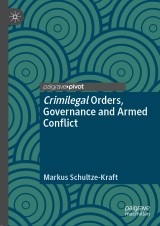Details

Crimilegal Orders, Governance and Armed Conflict
|
58,84 € |
|
| Verlag: | Palgrave Pivot |
| Format: | |
| Veröffentl.: | 12.12.2018 |
| ISBN/EAN: | 9783030034429 |
| Sprache: | englisch |
Dieses eBook enthält ein Wasserzeichen.
Beschreibungen
<p>Comprehensively laying out the concept of <i>crimilegality</i>, this book presents a novel perspective on the relationship between what is conventionally termed organised crime and political order in the contemporary developing world. In hybrid <i>crimilegal</i> orders the moral, normative and social boundaries between legality and illegality-criminality are blurred, and through the violation of the official law, the illegal-criminal sphere of social life becomes legitimate and morally acceptable, while the legal turns illegitimate and immoral. Several examples of <i>crimilegality </i>and <i>crimilegal</i> governance in Colombia and Nigeria, including in relation to armed conflict termination, are used to illustrate these complex processes.</p>
1. Introduction.- 2. <i>Crimilegal </i>Order: What's Behind a Term?.- 3. Mobbed-Up, Corrupt or <i>Crimilegal </i>Orders?.- 4. Instances of <i>Crimilegality </i>in Colombia and Nigeria.- 5. Governance and Violence in <i>Crimilegal </i>Orders.- 6. Overcoming Armed Conflict in <i>Crimilegal </i>Orders.- 7. By Way of Conclusion: Taking the Research on <i>Crimilegality </i>Forward.
<div><p><b>Markus Schultze-Kraft</b> is Associate Professor in the Department of Political Studies at Universidad Icesi, Colombia. </p><br></div>
<p>“A major contribution to the literature. The book adds an important facet to the discourse on organized crime and illegal governance.”</p>
<p>—<b>Klaus von Lampe</b>, John Jay College of Criminal Justice, CUNY, USA</p>
<p> </p>
<p>“Markus Schultze-Kraft's impressive new book on <i>crimilegal </i>orders explores the interface between politics, organised crime and violence and develops a theoretically sophisticated analysis of how state legality works and for whom in a globalised world.”</p>
<p>—<b>Robin Luckham</b>, Institute of Development Studies, University of Sussex, UK<i></i></p>
<p><i> </i></p>
<p>“This is an important book that makes an excellent contribution to understanding how criminality affects governance.”</p>
<p>—<b>Paul Jackson</b>, International Development Department, University of Birmingham, UK</p>
<p> </p>
<p>“Schultze-Kraft’s efforts to demystify the grey zones of the '<i>crimilegal </i>order' are illuminating and will be invaluable for scholars.”</p>
<p>—<b>Ivan Briscoe</b>, International Crisis Group, Colombia</p>
<p> </p>
<p>Comprehensively laying out the concept of <i>crimilegality</i>, this book presents a novel perspective on the relationship between what is conventionally termed organised crime and political order in the contemporary developing world. In hybrid <i>crimilegal</i> orders the moral, normative and social boundaries between legality and illegality-criminality are blurred, and through the violation of the official law, the illegal-criminal sphere of social life becomes legitimate and morally acceptable, while the legal turns illegitimate and immoral. Several examples of <i>crimilegality </i>and <i>crimilegal</i> governance in Colombia and Nigeria, including in relation to armed conflict termination, are used to illustrate these complex processes.</p>
<p> </p>
<p><b>Markus Schultze-Kraft</b> is Associate Professor in the Department of Political Studies at Universidad Icesi, Colombia. </p>
<p>—<b>Klaus von Lampe</b>, John Jay College of Criminal Justice, CUNY, USA</p>
<p> </p>
<p>“Markus Schultze-Kraft's impressive new book on <i>crimilegal </i>orders explores the interface between politics, organised crime and violence and develops a theoretically sophisticated analysis of how state legality works and for whom in a globalised world.”</p>
<p>—<b>Robin Luckham</b>, Institute of Development Studies, University of Sussex, UK<i></i></p>
<p><i> </i></p>
<p>“This is an important book that makes an excellent contribution to understanding how criminality affects governance.”</p>
<p>—<b>Paul Jackson</b>, International Development Department, University of Birmingham, UK</p>
<p> </p>
<p>“Schultze-Kraft’s efforts to demystify the grey zones of the '<i>crimilegal </i>order' are illuminating and will be invaluable for scholars.”</p>
<p>—<b>Ivan Briscoe</b>, International Crisis Group, Colombia</p>
<p> </p>
<p>Comprehensively laying out the concept of <i>crimilegality</i>, this book presents a novel perspective on the relationship between what is conventionally termed organised crime and political order in the contemporary developing world. In hybrid <i>crimilegal</i> orders the moral, normative and social boundaries between legality and illegality-criminality are blurred, and through the violation of the official law, the illegal-criminal sphere of social life becomes legitimate and morally acceptable, while the legal turns illegitimate and immoral. Several examples of <i>crimilegality </i>and <i>crimilegal</i> governance in Colombia and Nigeria, including in relation to armed conflict termination, are used to illustrate these complex processes.</p>
<p> </p>
<p><b>Markus Schultze-Kraft</b> is Associate Professor in the Department of Political Studies at Universidad Icesi, Colombia. </p>
Provides innovation in terms of its conceptual-theoretical contribution to the relationship between criminality, governance and armed conflict Based on in-depth field work in Colombia and rich primary and secondary source material from a range of other country cases Has multi-disciplinary appeal and speaks to both academic audiences from a number of social science disciplines and a range of specialized practitioners, including law enforcement professionals and specialized bilateral and multilateral organizations
Provides innovation in terms of its conceptual-theoretical contribution to the relationship between criminality, governance and armed conflict<br><br>Based on in-depth field work in Colombia and rich primary and secondary source material from a range of other country cases<br><br>Has multi-disciplinary appeal and speaks to both academic audiences from a number of social science disciplines and a range of specialized practitioners, including law enforcement professionals and specialized bilateral and multilateral organizations

















